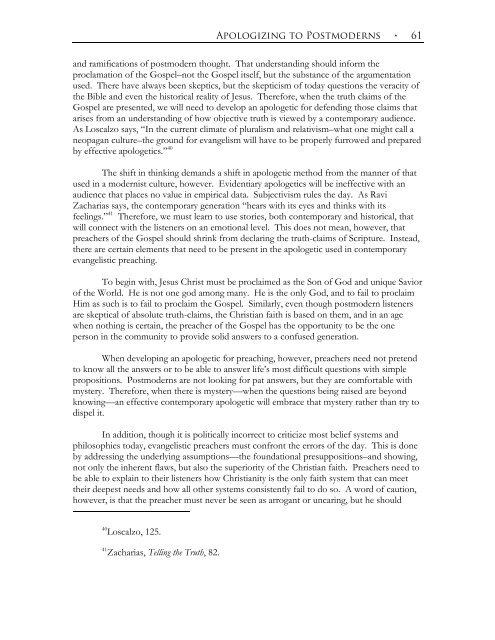0 jbtm vol. 6, no. 2 the proclamation of the gospel - Baptist Center for ...
0 jbtm vol. 6, no. 2 the proclamation of the gospel - Baptist Center for ...
0 jbtm vol. 6, no. 2 the proclamation of the gospel - Baptist Center for ...
You also want an ePaper? Increase the reach of your titles
YUMPU automatically turns print PDFs into web optimized ePapers that Google loves.
Apologizing to Postmoderns ٠ 61<br />
and ramifications <strong>of</strong> postmodern thought. That understanding should in<strong>for</strong>m <strong>the</strong><br />
<strong>proclamation</strong> <strong>of</strong> <strong>the</strong> Gospel–<strong>no</strong>t <strong>the</strong> Gospel itself, but <strong>the</strong> substance <strong>of</strong> <strong>the</strong> argumentation<br />
used. There have always been skeptics, but <strong>the</strong> skepticism <strong>of</strong> today questions <strong>the</strong> veracity <strong>of</strong><br />
<strong>the</strong> Bible and even <strong>the</strong> historical reality <strong>of</strong> Jesus. There<strong>for</strong>e, when <strong>the</strong> truth claims <strong>of</strong> <strong>the</strong><br />
Gospel are presented, we will need to develop an apologetic <strong>for</strong> defending those claims that<br />
arises from an understanding <strong>of</strong> how objective truth is viewed by a contemporary audience.<br />
As Loscalzo says, “In <strong>the</strong> current climate <strong>of</strong> pluralism and relativism–what one might call a<br />
neopagan culture–<strong>the</strong> ground <strong>for</strong> evangelism will have to be properly furrowed and prepared<br />
by effective apologetics.” 40<br />
The shift in thinking demands a shift in apologetic method from <strong>the</strong> manner <strong>of</strong> that<br />
used in a modernist culture, however. Evidentiary apologetics will be ineffective with an<br />
audience that places <strong>no</strong> value in empirical data. Subjectivism rules <strong>the</strong> day. As Ravi<br />
Zacharias says, <strong>the</strong> contemporary generation “hears with its eyes and thinks with its<br />
feelings.” 41 There<strong>for</strong>e, we must learn to use stories, both contemporary and historical, that<br />
will connect with <strong>the</strong> listeners on an emotional level. This does <strong>no</strong>t mean, however, that<br />
preachers <strong>of</strong> <strong>the</strong> Gospel should shrink from declaring <strong>the</strong> truth-claims <strong>of</strong> Scripture. Instead,<br />
<strong>the</strong>re are certain elements that need to be present in <strong>the</strong> apologetic used in contemporary<br />
evangelistic preaching.<br />
To begin with, Jesus Christ must be proclaimed as <strong>the</strong> Son <strong>of</strong> God and unique Savior<br />
<strong>of</strong> <strong>the</strong> World. He is <strong>no</strong>t one god among many. He is <strong>the</strong> only God, and to fail to proclaim<br />
Him as such is to fail to proclaim <strong>the</strong> Gospel. Similarly, even though postmodern listeners<br />
are skeptical <strong>of</strong> absolute truth-claims, <strong>the</strong> Christian faith is based on <strong>the</strong>m, and in an age<br />
when <strong>no</strong>thing is certain, <strong>the</strong> preacher <strong>of</strong> <strong>the</strong> Gospel has <strong>the</strong> opportunity to be <strong>the</strong> one<br />
person in <strong>the</strong> community to provide solid answers to a confused generation.<br />
When developing an apologetic <strong>for</strong> preaching, however, preachers need <strong>no</strong>t pretend<br />
to k<strong>no</strong>w all <strong>the</strong> answers or to be able to answer life’s most difficult questions with simple<br />
propositions. Postmoderns are <strong>no</strong>t looking <strong>for</strong> pat answers, but <strong>the</strong>y are com<strong>for</strong>table with<br />
mystery. There<strong>for</strong>e, when <strong>the</strong>re is mystery—when <strong>the</strong> questions being raised are beyond<br />
k<strong>no</strong>wing—an effective contemporary apologetic will embrace that mystery ra<strong>the</strong>r than try to<br />
dispel it.<br />
In addition, though it is politically incorrect to criticize most belief systems and<br />
philosophies today, evangelistic preachers must confront <strong>the</strong> errors <strong>of</strong> <strong>the</strong> day. This is done<br />
by addressing <strong>the</strong> underlying assumptions—<strong>the</strong> foundational presuppositions–and showing,<br />
<strong>no</strong>t only <strong>the</strong> inherent flaws, but also <strong>the</strong> superiority <strong>of</strong> <strong>the</strong> Christian faith. Preachers need to<br />
be able to explain to <strong>the</strong>ir listeners how Christianity is <strong>the</strong> only faith system that can meet<br />
<strong>the</strong>ir deepest needs and how all o<strong>the</strong>r systems consistently fail to do so. A word <strong>of</strong> caution,<br />
however, is that <strong>the</strong> preacher must never be seen as arrogant or uncaring, but he should<br />
40 Loscalzo, 125.<br />
41 Zacharias, Telling <strong>the</strong> Truth, 82.


